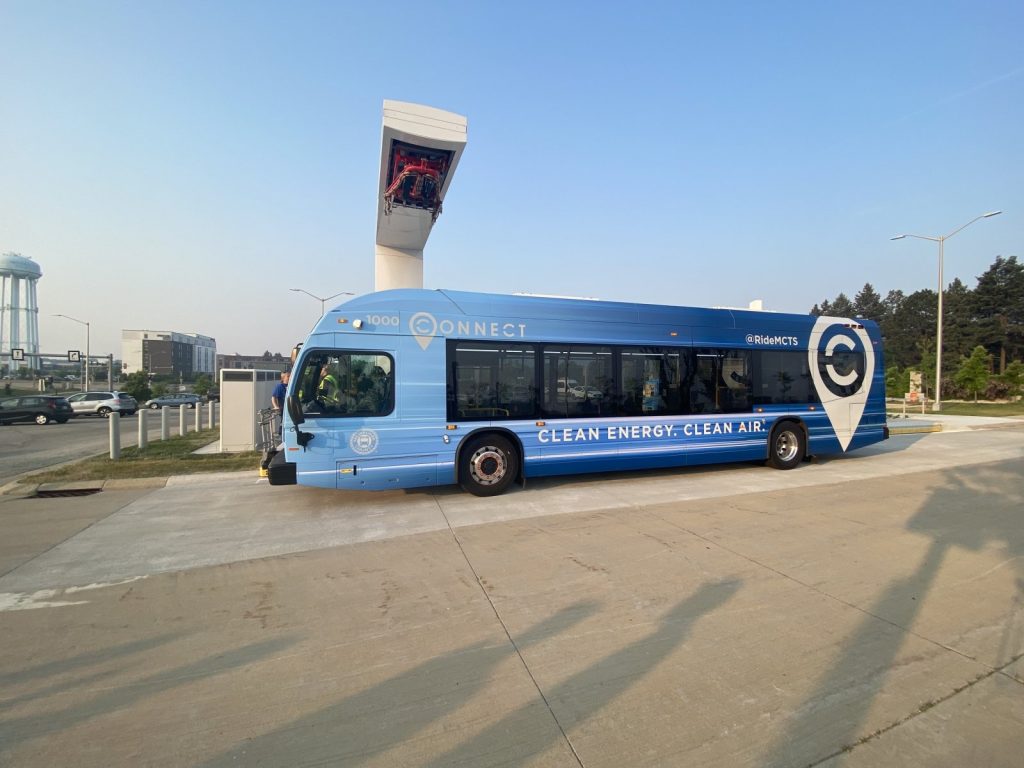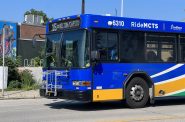Transit Officials Done With Battery Electric Buses
Officials want to stick with clean-diesel until technology, market conditions improve.

Battery Electric Bus. Photo by Graham Kilmer.
Milwaukee County won’t be purchasing new battery electric buses anytime soon.
The Milwaukee County Transit System (MCTS) has operated battery electric buses for less than a year, and in light of a spotty first nine months and changing “market realities,” officials are planning to only purchase clean-diesel buses in the near term.
Top transportation officials have suggested in recent months that ordering new BEBs is not a good idea for the county. One of the primary reasons is that there aren’t any manufacturers in the U.S. market officials trust. The BEB manufacturer MCTS purchased the county’s first BEBs from left the U.S. market in 2023 and isn’t accepting new orders. And on top of it all, the technology has not proven itself reliable and the buses are incredibly expensive.
Officials from MCTS and the Milwaukee County Department of Transportation (MCDOT) will go before the Milwaukee County Board of Supervisors in March seeking changes to the county policy for battery electric buses and fleet replacement.
Officials are proposing that the county continue to replace aging buses with new clean-diesel buses. Additionally, transitioning to an alternative fuel source bus will be paused until “these vehicles are further tested, easily available, determined to be fiscally sustainable and have the appropriate infrastructure deployed within Milwaukee,” according to the draft policy.
This would tweak the county’s existing policy, which only held off on transitioning the fleet from diesel to battery electric until the end of a BEB pilot program, which was the implementation of 11 BEBs along the Connect 1 bus rapid transit line.
Milwaukee County began pursuing battery electric buses in 2018 for Connect 1. The county board chairman at the time, Theodore Lipscomb, Sr., added funding to the 2019 budget to increase the county’s initial order from 11 to 15. A year later, he used the budget again to make it the county’s policy to pursue a full transition of the fleet to BEBs. That policy was eventually walked back in 2021, with MCDOT requesting a pause on fleet transition until the pilot program along Connect 1 was finished.
Just as the development of Connect 1 influenced the county’s policy toward BEBs, the development of a second bus rapid transit service has become a primary consideration for changing it.
MCTS and MCDOT are working with consultants from HNTB to develop a second bus rapid transit line, called Connect 2, running north and south through the 27th Street corridor. This second route will be double the size and cost of Connect 1, at 19 miles and an estimated $148 million. MCTS estimates it will need approximately 40 buses to operate the route, and officials do not want to double down on BEB technology that is vastly more expensive and has a spotty, unproven track record.
“I think [BEBs] are just still in their infancy, really,” Denise Wandke, MCTS Managing Director told Urban Milwaukee, adding that the transit system may return to the technology in the future.
The first BEBs launched on the Connect 1 in June 2023, and by the end of the month one bus already needed a battery replacement. Around this time, Nova Bus, the county’s BEB manufacturer, left the U.S. market and stopped accepting orders. In August, NovaBus issued a manufacturer recall and all 11 Connect 1 buses were pulled from the road.
Procuring new BEBs will be a costly and time-consuming undertaking. MCTS still hasn’t received all 15 it ordered from NovaBus. MCDOT Director Donna Brown-Martin has previously said that the manufacturers who remain in the market are either producing untrustworthy technology, facing bankruptcy or unable to make a delivery anytime soon.
David Locher, MCTS enhanced transit manager, told Urban Milwaukee that if the county pursues BEBs for Connect 2, these buses would become the “prime factor” determining when the service launches. Right now, the Connect 2 is planned to launch in 2028.
“We really want to prioritize reliability and consistency,” Locher said. “And we think in the near term, there are too many unknowns and too many growing pains with the technology to provide that commitment to our riding public.”
The concerns over unreliability are amplified when transit officials consider the cost for a BEB compared to a clean-diesel bus. One BEB costs approximately $1.2 million; one clean-diesel bus costs $650,000.
Transit officials will continue to evaluate the possibility of transitioning to a clean fuel source for the fleet, according to a memo drafted for the county board, but in the meantime, will stick with clean-diesel buses in light of cost and reliability.
If you think stories like this are important, become a member of Urban Milwaukee and help support real, independent journalism. Plus you get some cool added benefits.
MKE County
-
RNC Will Cause Some County Services To Be Moved to Wauwatosa
 Jul 12th, 2024 by Graham Kilmer
Jul 12th, 2024 by Graham Kilmer
-
Hank Aaron State Trail Will Be Closed For RNC, State Fair
 Jul 12th, 2024 by Graham Kilmer
Jul 12th, 2024 by Graham Kilmer
-
MCTS Designing New Bus Shelters
 Jul 10th, 2024 by Graham Kilmer
Jul 10th, 2024 by Graham Kilmer
Transportation
-
MCTS Adds 28 New Buses
 Jul 13th, 2024 by Graham Kilmer
Jul 13th, 2024 by Graham Kilmer
-
MCTS Designing New Bus Shelters
 Jul 10th, 2024 by Graham Kilmer
Jul 10th, 2024 by Graham Kilmer
-
MCTS Updates RNC Bus Detours To Better Serve Downtown, Riders
 Jul 9th, 2024 by Jeramey Jannene
Jul 9th, 2024 by Jeramey Jannene






















I continued to be appalled at the way this reporter writes these stories. First of all, why is he uncritically using the term “clean diesel bus”? What does that mean? Do these buses not emit carbon dioxide, nitrous oxide, carbon monoxide and other pollutants? How “clean” are they compared with battery electric buses? Second, why is MCDOT’s assertions about the availability and reliability of BEBs taken at face value with no apparent investigation of the matter or second opinion? Third, why are MCDOT’s claims about the relative costs of the vehicles taken at face value? It is well established that electric vehicles in general cost more up front but are much cheaper to operate and can save money over the lifetime of the vehicle. Why does the reporter not even ask these questions? This looks like journalistic malpractice to me, taking government officials’ statements at face value without doing any homework on the issue or even seeming to seek other viewpoints on the matter.
This situation points out some fundamental things which have little to do with electric v. diesel technology.
1) The county board generally lacks the technical acumen to make these sorts of detailed technical and purchasing decisions – let alone to enshrine them in policy. Just as the board has corporation counsel to advise them on legal matters, they should seek competent counsel on technology before making this sort of policy commitment.
2) MCTS should never have been put in the position of essentially being a test site for new technology. They simply don’t have the resources. With chronic financial challenges and staffing challenges, they should have been allowed to choose buses for Connect 1 which were within their existing capabilities.
The best case now is that the BEBs will be an orphaned fleet of expensive to maintain, but reliable, buses. The worst case is that they will be white elephants.